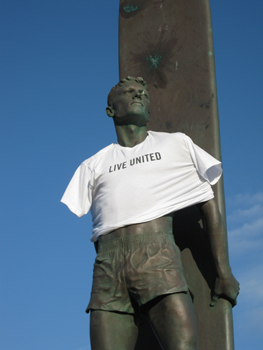The UCSC community is receiving a prestigious Gold Award for donating to the United Way of Santa Cruz County this year, stepping up its contributions in spite of economic uncertainties.
A long, slow recovery from an economic recession couldn't put a damper on donations. If anything, hard times were a motivating factor. Participants in UCSC's year-end 2010 workplace campaign said they felt a personal responsibility toward Santa Cruz County residents who are in need, especially those who are out of work or just one paycheck away from homelessness.
"It’s very simple," said Branwyn Wagman, associate director of operations and communications for UCSC's Biomolecular Science & Engineering Department, and one of the campus's top 21 donors to the United Way of Santa Cruz County over the past few years. "If I am able to give, I should do it."
A total of 251 staff and faculty members gave this year. Giving as a group sends a clear message, Wagman said: "The campus community is giving to the Santa Cruz County community."
UCSC ranked among the top six donors to United Way this year. The campus's total donations in the 2010 campaign were $53,277--a significant portion of the $1 million that the organization raised this year.
Liz Evanovich, UCSC's community engagement coordinator for University Relations and the campus's United Way campaign coordinator, was very pleased with the results. "Our staff and faculty understand the critical needs in our community," she said.
Meanwhile, the campus's list of "Leadership Givers"--UCSC staff and faculty members who have contributed large amounts to the United Way of Santa Cruz County over the past few years--has grown from 18 to 21 people. This list includes "Bronze" givers who have contributed between $500 to $999 over the past few years and "Silver" donors who have given between $1,000 and $2,499.
One of the "Silver" contributors is UCSC biomolecular science and engineering professor Kevin Karplus, who contributes to United Way, Second Harvest Food Bank, and Planned Parenthood through payroll deductions. "It’s part of my view about being an ethical person," Karplus said. "Part of what I earn should go back to the community."
The campus's fundraising efforts will be recognized at the 2011 Live United Celebration Luncheon on Friday, April 1, 11:30 a.m. to 1:30 p.m . at the Cocoanut Grove in Santa Cruz.
The United Way of Santa Cruz County is an independent nonprofit organization, now in its seventh decade of operation. It raises and invests money from individuals as well as corporations, helping the organization team up with 33 area programs and other nonprofits selected by donors.
"It's not just about giving money," said Anne Cawley, United Way's director of community giving and marketing. "It’s also about volunteering and advocacy--and that is what UCSC's community did for us this year. Considering the economic worries, it is extraordinary that the amount went up as much as it did."
Cawley is struck by the fact that people kept on contributing dollars and time even when money was tight. In times of economic difficulty, "the people who are having a hard time are no longer faceless," she continued. "These are our friends and family members. Every single one of us knows someone [who is struggling economically]."
United Way’s donors are aware of the growing need in Santa Cruz County, Cawley said.
"There are a lot of people who are on the edge right now," Cawley said. "These funds help keep families from spiraling into poverty. Once that spiral starts, it's really difficult to pull yourself around."
To stop that spiral, the United Way partners with organizations that reach out to families, including the Watsonville Law Center, the Santa Cruz Community Counseling Center, the Community Action Board, the Homeless Services Center, La Manzana Community Resources, and Santa Cruz Community Ventures.
Last summer, the United Way of Santa Cruz County also started a new program called 211, a health and human services hotline. The service offers immediate help to residents in need, including those who have never asked for help before and aren't sure where to turn.
For example, a local entrepreneur who owns his graphic design business found himself in a scary situation. Suddenly his work dried up and he had no idea where to turn, Cawley said. He was running out of money and food quickly. The 211 hotline directed him to the resources he needed.
"There is a safety net in this county,” Cawley said. "[But] we want to make sure that people know how to find it when they need it.”



